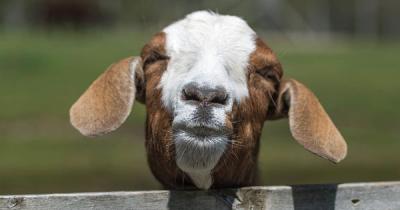Something Got Your Goat? Paducah’s Goat Problem of 1898

Invasive species. Asian Carp, Killer Bees, Cane Toads, and Burmese Python…just to name a few. They can be a real problem, causing havoc and disrupting the natural order of things. An invasive species can be truly destructive.
However, one does not usually think of goats in this way because…well, they’re goats.
But an invasion of goats was exactly what Paducahans struggled with in 1898…or at least a seeming excess of them.
For instance, on one day the local Elks Club assembled for a meeting and found a goat inside the lodge gotten eating their altar cloth (January 18, 1898, Paducah Daily Sun). The Elks suggested it was a Masonic goat that had gotten into the wrong hall. But despite, the humorous take, the goat was indicative of a growing plague. It got so bad, in fact, that the city had to pass a new law to address the critters.
The problem lay in the fact that too many local owners let their goats roam free, allowing them to destroy property, cross breed, and become aggressive. Two areas of town saw the most problems: the south side of town around Mechanicsburg and the north side of town around 9th and Burnett.
The citizens of Mechanicsburg banded together to try to incite change. On March 8, 1898, the Paducah Daily Sun reported that “a petition was signed last night presented by 81 citizens requesting an ordinance prohibiting their running at large.”
Further, the Sun ran an editorial regarding the goat problem on the north side of town: “The locality at the north end of Ninth Street, or near Ninth and Burnett streets, is a veritable hot bed for goats. They form the army of the occupation and the army of the invasion of that highly goat-odorous locality. They sleep neither day nor night. They are on dress parade all day and at night they surpass the Spaniards for picket duty, patrolling the entire locality every fifteen minutes, and splitting the very heavens with their unearthly shrieks.”
The local council heard the complaints and passed an ordinance on April 17, 1898 that said, “It shall be unlawful for the owner of any goat to suffer the same to go or run at large upon any of the streets, alleys or unclosed lots or ground in the City of Paducah.” Fines for infractions of the new law ran from $5-$20 per offence.
While the new ordinance curbed some of the goat issues, there was still one goat-related problem that irked the citizenry…Goat Carts.
In the late 1800’s, goat carts were all the rage among children. Like their fathers hitched horses to carts and drove them around town, children did the same with the family goat. Many adults in town saw the goat cart fad as menace and sought to be an end to it.
But the new ordinance didn’t cover the issue of goat carts, and besides, the kids in town were prepared to fight to keep their carts on the streets. The following letter was printed in the Paducah Daily Sun on April 13, 1898:
“Deer sur and frend: I do not want Bily gotes kep offn the strets. I have a bily gote, and he never barks or gos mad. I uset to have a dog to driv my cart, but he wood not go like a horse or a got. When I wood hich him up, he wood not go unles I wood go ahed of him. I had to go ahed so much that my little brothr did all the riding, so I got me a gote. I think he is mity nice, all but his smell, and papa says that may wear off. Yors truly, George____”
For more about goats and such, visit us in the Local and Family History Department at the McCracken County Public Library.
–Matt Jaeger